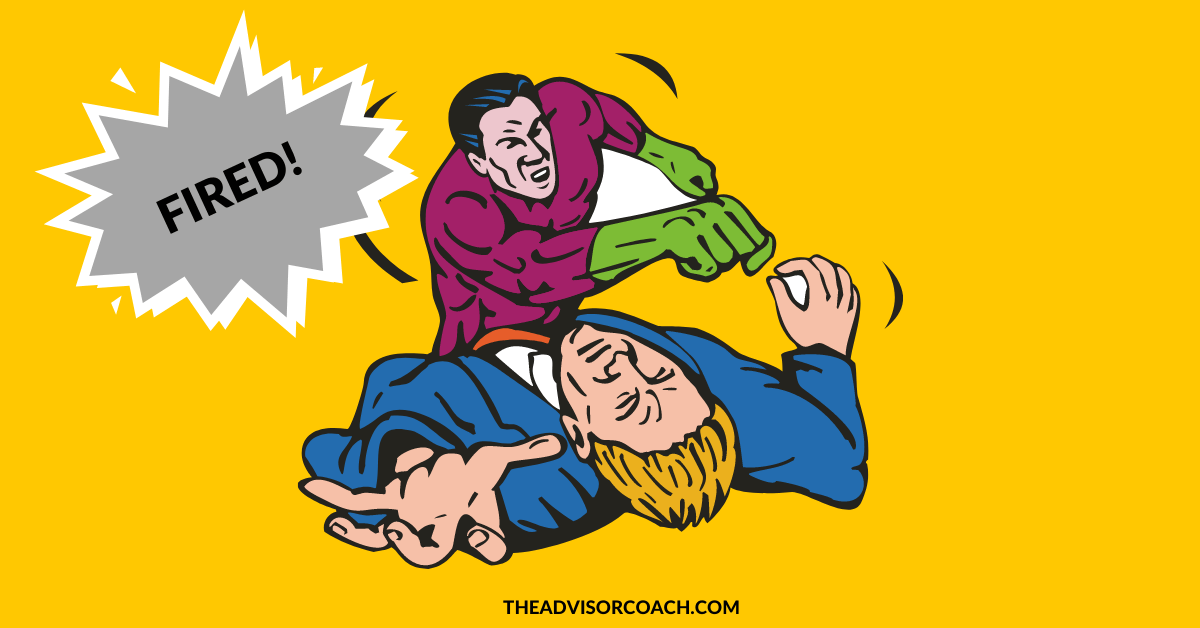Here's Why Clients Fire Financial AdvisorsIt’s happened to the best of us.
You get that phone call, email, or letter basically saying “we’re through”. And no, I’m not talking about boyfriends and girlfriends (although I wrote an article about how prospecting is like dating)… I’m talking about when financial advisors get fired by their clients. The Cost Of Client Attrition...According to PriceMetrix, financial advisors lose an average of 5-10% of their clients per year. The chances of leaving are even worse for households with more than $100,000 in assets — these clients have a 13% chance of leaving their financial advisors annually.
For the average financial advisor (who makes about $90,000 - $124,000 per year depending on which source you use), that 13% chance represents more than $11,000 in lost income. But that’s in an average year — in reality, this number could be much higher! Sure, you could go out and get new clients to replace this lost income. But as it turns out, keeping your clients is a lot cheaper than going out and getting new ones. According to the Harvard Business Review, acquiring a new client is anywhere from five to twenty-five times more expensive than retaining an existing client. This means if you lose a client, your actual loss could be much higher than the 13% figure I just gave you. Imagine losing more than 13% of your income in one year. No one wants that — so how can you prevent it? You’ve got to know the reasons why financial advisors get fired. After all, if you were working at a car dealership and you saw your fellow salespeople get fired for burning rubber in the cars, what would you do? The correct answer is to not burn rubber in the cars. Here are the top five reasons why clients leave their financial advisors, and how to prevent them... ALSO READ: A Day In The Life of a Financial Advisor 1. The Advisor Doesn't Communicate EnoughIt sounds simple: just keep in touch with your clients. But the problem is that a lot of financial advisors bite off more than they can chew.
If you’re a brand new advisor with a small book of business, you have absolutely no excuse. Communicating with your clients should be a top priority. For seasoned financial advisors with tons of clients, you can only allocate so much of your time to each one. This is an extreme example, but if you’ve got a book of business with clients ranging from $10K AUM to $10M AUM, you’ll naturally allocate more of your time to the higher-end clients and hope that they rest just stay with you. Here’s the good thing about this problem: it's the easiest one to fix. You’ve got a few options for doing so:
Automation might not solve all of your communication problems, but it’ll definitely make them easier. As for the last option, a lot of advisors get nervous about bringing on an associate. But if they don’t want to lose their lower-end clients altogether, there’s really no other viable option. If you literally cannot keep in touch with everyone you serve, they’re going to leave. What’s worse is that they’re going to spread the word about how you didn’t keep in touch. ALSO READ: 5 Best Niches for Financial Advisors 2. The Advisor Doesn't Return Phone Calls Fast EnoughIt’s not just how often advisors communicate — it’s also a matter of how quickly they respond.
This insight comes from a study conducted by Financial Advisor magazine. Nearly 1,400 advisors shared the most common explanations clients gave for firing their previous advisor. 44% said that it was because their phone calls weren’t returned fast enough. That’s not all. Other research shows that:
I know that sometimes the phones ring off the hook. The best solution, aside from fine-tuning your schedule, is to coach your clients on what to do and what to expect. You can also keep them on-course by reminding clients about their financial goals and expected time frame to reaching them. You don’t want to eliminate the phone calls completely, but you do want to eliminate the ones that stem from a panic attack after binge-watching CNBC. 🔑 That said, here’s one rule of thumb for phone calls: return them on the same day. But if you feel like you’re sacrificing marketing and prospecting time to return client calls, it’s time to think about hiring someone. Marketing and prospecting are your highest value activities — you should never give them up to return client calls. 3. The Advisor Doesn't Understand The Client's GoalsA big part of the solution here is being a good listener. Dig deep into what clients want.
Sometimes clients might not even know what they want — so it’s up to you to help draw that out. Don’t be afraid to ask questions. After your meetings, jot down detailed notes about what clients said in your CRM. For example: if your client talked about wanting to go to Paris in a few months, you should bring that up at your next meeting. You also need to stay on top of clients’ goals because situations and circumstances change — and oftentimes, clients won’t volunteer that info to you. Why? It’s not their first instinct to let you know that they might be changing careers or getting a divorce. Some might, but the majority won’t. What that means is that you’re often working with old data — yet clients expect you to be up-to-date with their current situation. So listen, take notes, and check in with clients. For example, you can say something like, “Last time we met, you mentioned that this was important to you. Is it still important?” You might also pick up on patterns over time, like charity work among UHNW clients. Keep an eye out for these trends because they represent what’s important to the client. Then check in on these issues to show that you’re on top of their concerns and know what’s important to them. ALSO READ: 5 Client Loyalty Strategies to Help You Retain More Clients 4. The Advisor Doesn't Give Good AdviceThis makes sense. If you hire a financial advisor, you’re banking on the fact that this person can provide you with advice to help your financial situation.
But what is the root cause here? Is it really that financial advisors don’t know what they’re doing? I don’t think so. Financial advisors are some of the smartest people I’ve ever met. I don’t mean they can teach me about Einstein’s theory of relativity, but I mean that when it comes to making good decisions and laying out a plan, there’s nobody better. The issue isn’t that financial advisors don’t know enough — it’s just that they don’t know a particular client’s situation well enough. When I see advisors get fired because of this, it’s usually because they’re spreading themselves too thin with the types of clients they serve. You cannot possibly provide world-class advice to young, old, retired, working, executives, physicians, conservative, and aggressive people all at the same time. 🔑 The solution here: choose a niche and stay within that niche. You could specialize in working with clients in a specific occupation or phase of life, for example. Having a niche makes everything easier. You’ll eventually develop an unparalleled level of competency, where you’ll know the niche’s challenges and solutions like the back of your hand. Then you’ll be able to deliver great advice consistently. 5. The Client's Portfolio Is Performing PoorlyThere are some things you can’t control. Everybody hates losing money, and if the overall markets are down, you will hear about it.
According to the Financial Customer Experience Report by Qualtrics, 42% of people choose their financial advisor because of a good investment track record, and only 8% leave because of a poor investment track record. In other words, having poor investment performance isn't as big of a deal as some "gurus" and "experts" make it seem. In fact, clients are nearly twice as likely (14%) to leave you because of high fees than a poor investment track record. After that, the top reasons for leaving a financial advisor include poor customer service and a lack of personal attention, which I've discussed in this article. Really, the issue here is the advisor not setting the right expectations for the client. In an episode of my podcast (search "Financial Advisor Marketing" wherever you listen to podcasts to find it), I talk about setting expectations around investment performance specifically. When a client fires you because their investments are doing poorly, it’s really a symptom of not having the correct expectation set. Advisors take pride in creating financial plans for all types of markets, but not all clients know that. This issue is more of a problem in setting and managing client expectations because they’re counting on you to grow their money even when the market’s down. There are a couple of things you can do in a poorly performing market: ✨ First of all, stay calm. The financial services industry is one of the most stressful in the world, so if you can’t cope with stressful situations, perhaps you shouldn’t be in it. You should remain upbeat, enthusiastic, and always have on your game face. It makes a difference when your clients are worried — they want someone who can reassure them when there’s a big market correction or things aren’t exactly going according to plan. 💰 Secondly, take the time to explain to clients what’s going on and how investing works. It doesn’t matter if they have millions of dollars — they might not have a clue what’s going on. Explain to them that the stock market will be choppy in the short term, but over the long term, they should come out ahead. If you dig a little deeper, you’ll find that most investors don’t want to take huge risks for huge returns — they just want their money to be used efficiently. When you make the case that what you’re doing is the most efficient way to put their money to use (over the long-term!), they are more likely to stay with you. The Bottom Line: Set Client ExpectationsThere’s a common theme in the reasons clients give for firing their financial advisors: it really all comes down to setting and managing client expectations.
These expectations apply to your fees, how meetings will run, when clients can call you, and so on. Making these clear will set both you and your clients up for a better experience working together. You also need to set boundaries with your clients regarding the level of service and type of service you provide. This will save you time and prevent “scope creep” — situations where clients keep asking for more and more. Clients don’t call or message you with ill intentions — they do it because they’re unaware. Make sure you put the information in this article to good use to keep your clients around for longer. If you have any questions, feel free to reach out and I’ll help you if I can. P.S. If you're a financial advisor who wants to get more clients from LinkedIn, make sure you check out How to Get Clients With LinkedIn: How Financial Advisors Can Set Appointments and Convert Prospects With LinkedIn. |



